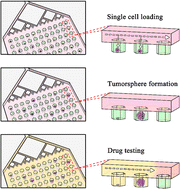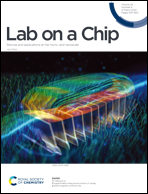Selective expansion of renal cancer stem cells using microfluidic single-cell culture arrays for anticancer drug testing†
Abstract
The suboptimal prognosis associated with drug therapy for renal cancer can be attributed to the presence of stem-cell-like renal cancer cells. However, the limited number of these cells prevents conventional drug screening assays from effectively assessing the response of renal cancer stem cells to anti-cancer agents. To address this issue, the present study employed microfluidic single-cell culture arrays to expand renal cancer stem cells by exploiting the anti-apoptosis and self-renewal properties of tumor stem cells. A microfluidic chip with 18 000 hydrophilic microwells was designed and fabricated to establish the single-cell culture array. Over a 7 day culture, the large-scale single-cell culture yielded a limited quantity of single-cell-derived tumorspheres. The sphere formation rates for Caki-1, 786-O, and ACHN cells were determined to be 8.74 ± 0.53%, 12.02 ± 1.43%, and 4.98 ± 1.68%, respectively. The expanded cells exhibited stemness characteristics, as indicated by immunofluorescence, flow cytometry, serial passaging, and in vitro differentiation assays. Additionally, the comparative transcriptomic analysis showed significant differences in the gene expression patterns of the expanded cells compared to the differentiated renal cancer cells. The drug testing indicated that renal cancer stem cells exhibited reduced sensitivity towards the tyrosine kinase inhibitors sorafenib and sunitinib, compared to differentiated renal cancer cells. This reduced sensitivity can be attributed to the elevated expression levels of tyrosine kinase in renal cancer stem cells. This present study provides evidence that the utilization of microfluidic single-cell culture arrays for selective cell expansion can facilitate drug testing of renal cancer stem cells.



 Please wait while we load your content...
Please wait while we load your content...